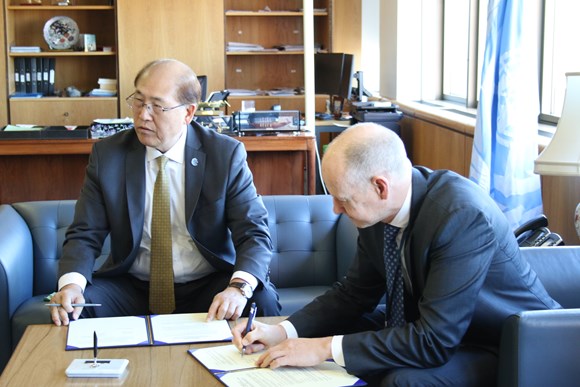
13 November 2019, 18:11
Norway boosts IMO's GreenVoyage-2050 GHG project

Partnerships and innovations are essential to combat climate change through reductions in GHG emissions. Norway has provided an additional NOK 40,000,000 (US$4.3. million) to the IMO-Norway GreenVoyage-2050 project, which will support GHG reductions in line with the IMO initial strategy for reducing greenhouse gas emissions from shipping. This supports UN SDG 13 on climate action. The project aims to assist countries to implement legal, policy and institutional reforms, build capacity and initiate and promote global efforts to demonstrate and test innovative technical solutions for reducing GHG emissions from shipping. IMO is currently in the process of selecting pioneer pilot countries, new pilot countries, partner countries, industry partners and strategic partners at national, regional and global levels.
The new tranche follows an initial funding of NOK 10,000,000 (US$1.1. million) for the project, provided earlier this year.
Meeting with IMO Secretary-General Kitack Lim to sign the agreement for additional funding (13 November), Mr Sveinung Oftedal, Specialist Director of the Norwegian Ministry of Climate and Environment, said, "Norway is very pleased to enhance our financial commitments to support IMO's efforts to build capacity and to provide technical assistance to support the IMO initial GHG strategy. We will continue our efforts to further support the GreenVoyage-2050 project, considering the importance of this project to achieve the goals of the IMO GHG strategy."
IMO is involved a range of partnerships which contribute to sustainable development and reflect UN SDG 17 (partnerships). Other IMO-executed global projects supporting the reduction of GHG emissions from shipping include the Global Industry Alliance to Support Low Carbon Shipping (GIA), under the auspices of the GEF-UNDP-IMO Global Maritime Energy Efficiency Partnerships Project (GloMEEP Project) the Global Maritime Technology Cooperation Centre Network (GMN) project, funded by the European Union and implemented by IMO.
Contact Information
Natasha Brown
Head, Public Information Services
IMO
+44 (0)20 7587 3274
+44 (0)7814702093
Nbrown@imo.org
Notes to editors
Read more:
http://www.imo.org/en/MediaCentre/HotTopics/Pages/Reducing-greenhouse-gas-emissions-from-ships.aspx
n 2018, IMO adopted an initial IMO strategy on reduction of GHG emissions from ships, setting out a vision which confirms IMO’s commitment to reducing GHG emissions from international shipping and to phasing them out as soon as possible.
IMO is also executing global technical cooperation projects to support the capacity of States, particularly developing States to implement and support energy efficiency in the shipping sector.
Click to download a PDF leaflet on IMO Action to reduce greenhouse gas emissions from international shipping, including a timeline.
Member States have been invited to submit concrete proposals on candidate short-term and mid-term measures to the Marine Environment Protection Committee (MEPC).
The MEPC is the decision-making body. The MEPC usually establishes a Working Group on Reduction of GHG Emissions from Ships, which meets during each MEPC session and reports to the plenary of the Committee. To help move forward with the implementation of the initial GHG strategy, intersessional meetings of the working group are also held.
The sixth meeting of the Intersessional Working Group on Reduction of GHG Emissions from Ships is being held 11-15 November 2019.
The seventh meeting of the Intersessional Working Group on Reduction of GHG Emissions from Ships will be held 23-30 March 2020. This is just before and back to back with the next Committee session, MEPC 75 (30 March to 3 April 2020).
The intersessional working group will:
- further consider concrete proposals to improve the operational energy efficiency of existing ships, with a view to developing draft amendments to Chapter 4 of MARPOL Annex VI and associated guidelines, as appropriate;
- further consider concrete proposals to reduce methane slip and emissions of Volatile Organic Compounds (VOCs);
- consider a draft MEPC resolution urging Member States to develop and update a voluntary National Action Plan (NAP) with a view to contributing to reducing GHG emissions from international shipping, and develop associated guidelines, as appropriate;
- further consider concrete proposals to encourage the uptake of alternative low-carbon and zero-carbon fuels, including the development of lifecycle GHG/carbon intensity guidelines for all relevant types of fuels and incentive schemes, as appropriate;
- consider the development of further actions on capacity-building, technical cooperation, research and development, including support for assessment of impacts and support for implementation of measures; and
- consider other concrete proposals for candidate measures.
The Intersessional Working Group on Reduction of GHG Emissions from Ships reports to the MEPC. So any recommendations can be put forward to the Committee. Member States can submit their proposals to the working group for discussion. The working group is also open to NGOs in consultative status with IMO as well as intergovernmental organizations.

